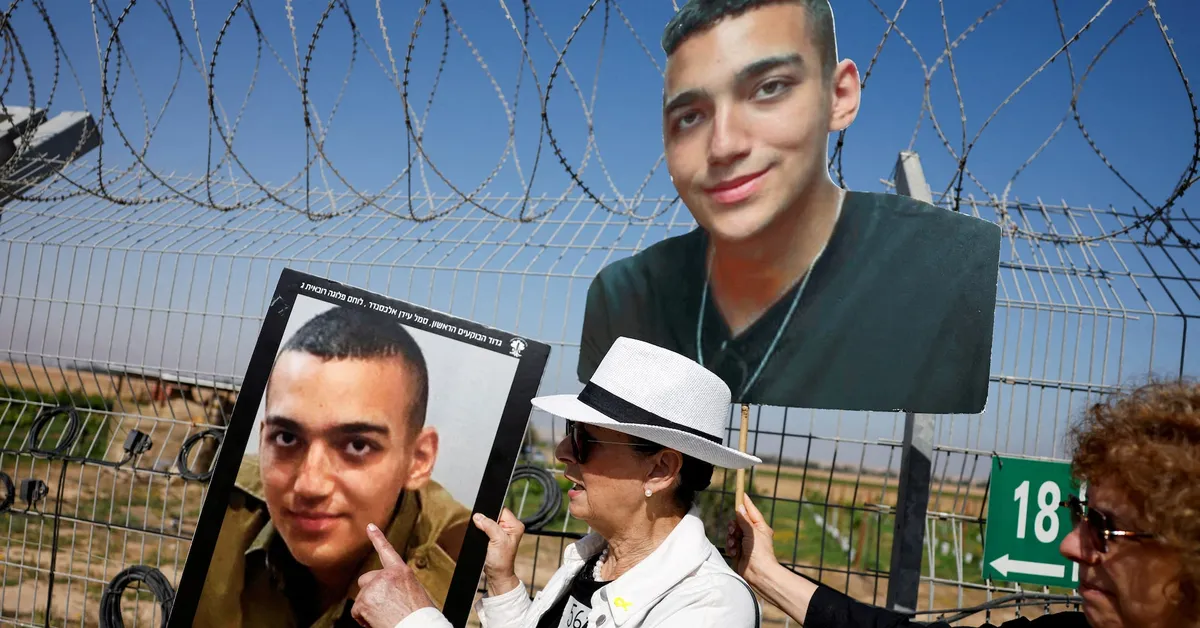
The senior Hamas official did not provide a specific timeline for the release of hostages, but a source familiar with the developments informed Reuters that it is likely to occur on Tuesday. The potential freeing of Alexander, who is believed to be the last surviving American hostage held by the militant Palestinian group, comes in advance of U.S. President Trump's upcoming visit to the Middle East this week. This move is part of ongoing efforts to establish a ceasefire agreement and enable humanitarian aid to enter the besieged Gaza enclave, as stated by the Palestinian militant organization.
Another notable official, the exiled Gaza Hamas chief Khalil al-Hayya, mentioned that the efforts to facilitate the release of hostages have been coordinated by Qatar, Egypt, and Turkey. Hayya emphasized that Hamas is prepared to immediately commence intensive negotiations and make substantial efforts to reach a conclusive agreement aimed at ending the ongoing conflict. He stated that the organization is committed to the exchange of prisoners in a mutually agreed manner.
According to a source who has been briefed on the negotiations, direct four-way talks that paved the way for the release involved officials from the U.S., Qatar, Egypt, and Hamas. However, there has been no immediate response from the Israeli prime minister's office regarding this announcement.
Hamas had previously released 38 hostages under a ceasefire that commenced on January 19. However, in March, Israel's military resumed its ground and aerial offensive on Gaza, effectively abandoning the ceasefire after Hamas declined proposals to extend the truce without the cessation of hostilities. Israeli officials have stated that their military operations will persist until the remaining 59 hostages are released and Gaza is fully demilitarized.
Hamas has maintained that it will only release hostages as a component of a broader agreement to end the war, rejecting demands to disarm. The militant group has expressed its willingness to release all remaining hostages taken during attacks in southern Israel on October 7, 2023, if Israel withdraws completely from Gaza and agrees to a permanent ceasefire.
Israel, currently controlling approximately one-third of Gaza's territory, has been enforcing an aid blockade since March. In May, Israeli officials announced plans to escalate military operations in Gaza. U.S. special envoy Adam Boehler remarked, “It’s a positive step forward,” while also urging Hamas to release the remains of four other Americans taken during the conflict. A spokesperson from the State Department noted that Hamas bears sole responsibility for the war and the resumption of hostilities.
Previous discussions involving the U.S. and Hamas focused on securing the release of American hostages held in Gaza. Reports from Israeli media indicated that Prime Minister Benjamin Netanyahu had mentioned in a closed session of the Foreign Affairs and Defense Committee that Hamas might soon release Alexander as a goodwill gesture ahead of Trump’s Middle East visit.
According to the prime minister's office, the U.S. has indicated that the potential release of Alexander by Hamas could initiate negotiations for the release of additional hostages. Israel’s policy dictates that negotiations will continue under the pressure of ongoing military operations, with a steadfast commitment to fulfilling all war objectives.
Israel's military campaign in Gaza was launched in retaliation for the Hamas attack on October 7, 2023, which resulted in the deaths of approximately 1,200 individuals, according to Israeli sources. This tragic event also led to 251 individuals being taken hostage, marking the deadliest day in Israel’s history. The ongoing military actions have claimed the lives of over 52,800 Palestinians, as reported by local health officials, and have devastated the Gaza Strip, which is now home to a population of 2.3 million reliant on dwindling aid supplies due to the blockade.